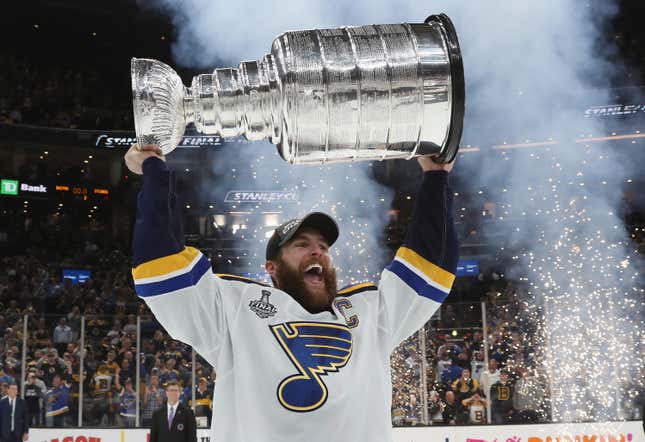
The St. Louis Blues are Stanley Cup champions. Say it to yourself, because no one’s ever been able to say it before. Swish it around in your mouth like a sommelier, picking out notes of gratification, bliss, and disbelief. Do not spit it out, because when you win the Stanley Cup, you keep drinking. Maybe this will all make more sense when the hangover comes, because it sure as hell doesn’t make much sense now. It doesn’t have to.
In their 52nd season, the Blues—the last of the Second Six teams to finally win a Cup, and who, once upon a time, were so hapless that the NHL changed its playoff format just to stop them from getting swept in final after final—were at one point not long ago pretty much assured to end it like the previous 51. It was January and they were in last place, dead last in the league, and no Big Four sports league had even seen a team in last even a quarter into the season win a championship. (That’s a factoid that made sense.) And so, in desperation, they fired their coaching staff and turned to a six-year AHLer who had started the season as the fourth-string goalie. Five months later, Craig Berube is still technically an interim head coach and Jordan Binnington is the first-ever rookie to win 16 playoff games.
“It’s a hell of a story to tell,” said captain Alex Pietrangelo, who’s been in St. Louis so long and experienced so much frustration that I was genuinely shocked to realize he’s still under 30; surely this should age a man faster. “It’s fucking unbelievable.”
Unbelievable that the Blues waltzed into Boston for Game 7 and couldn’t get a shot on goal for more than 16 minutes and somehow headed back to the dressing room with a 2-0 lead at the first intermission. Unbelievable that the Blues, only one of whom had ever been on a team that went to win a Cup, were as unflappable as their rookie netminder, while the Bruins, with finals vets up and down the roster, screwed up a line change so badly that Pietrangelo was able to stroll on net like Bobby Orr, and score what would prove to be the game-winner. Unbelievable that Binnington could put his pad there, then. “Believe in yourself,” Binnington said, “That’s all I can say, right?”
Binnington would have been a worthy Conn Smythe winner, as would Colton Parayko, the hulking shutdown defender who played monster minutes against the best forwards and pretty much locked up half the ice throughout the playoffs. But that honor went to Ryan O’Reilly, who was so fed up in Buffalo that he forced a trade from one cursed franchise to another, and then helped uncurse it by scoring 23 points in the postseason and nine in the final.
It’s the fitting ending to a postseason that was inexplicable even by the usual standards of playoff hockey. The clear best team failed to win a game. The league’s best players went out in the first, or failed to qualify at all. Teams that swept and looked like world-beaters promptly got swept in the next round. Bad calls decided games and even entire series. Road teams dominated. Chaos, but ultimately chaotic neutral—everyone suffered from some vagaries of puck fate, but everyone benefited too. You couldn’t believe in the essential fairness of the game, because there is none. You couldn’t even believe what you read in your local paper. What could you believe in?
“We believe in each other,” Vladimir Tarasenko said. “Our coaches make us believe in ourselves and the team, and it give us results.”
So, believe it, even if you don’t understand it. Understanding plays no part in this. All the Blues need to understand is that the Cup is heavy but feels light when you get to raise it, and that no one has ever gotten sick drinking out of it, and that the parade is on Saturday and doesn’t have to end until the puck drops in the fall.